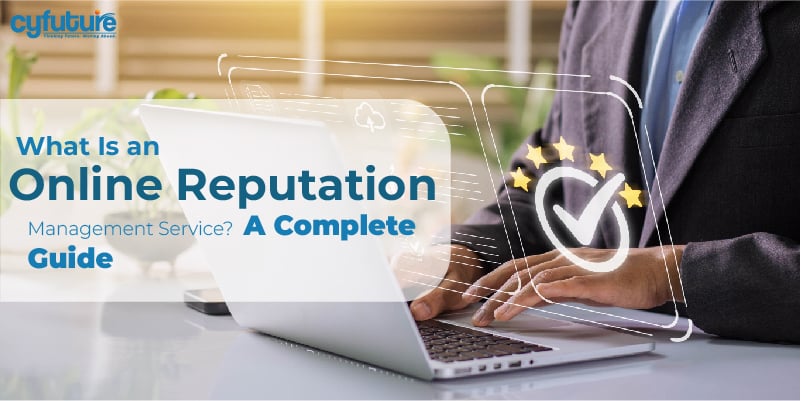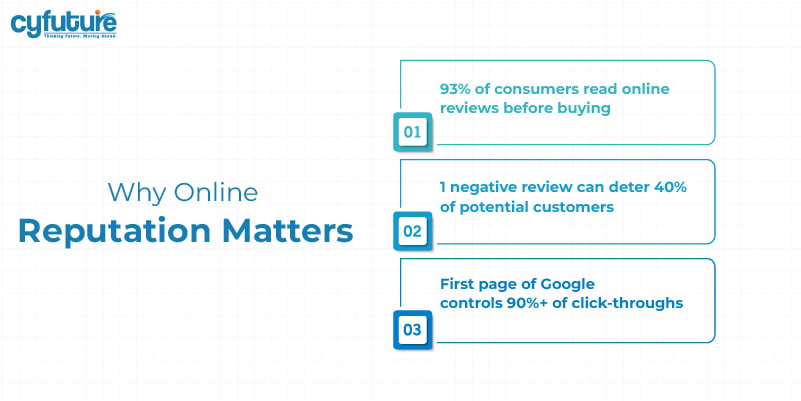-
Get Cloud GPU Server - Register Now!
Toggle navigation

In today’s digital-first world, a company’s online reputation can make or break its success. With consumers relying heavily on online reviews, social media feedback, and search engine results to form opinions, businesses must proactively manage their digital presence. This is where an Online Reputation Management Service comes into play.
At Cyfuture, we understand the critical role reputation plays in business growth. In this comprehensive guide, we’ll explore what an Online Reputation Management Service is, why it’s essential, how it works, and the best strategies to maintain a positive online image.
An Online Reputation Management Service is a strategic approach to monitoring, influencing, and improving how a brand, individual, or business is perceived online. It involves tracking mentions across search engines, social media, review sites, and forums while taking proactive steps to address negative feedback and highlight positive content.
ORM is not just about damage control—it’s about building trust, credibility, and authority in your industry. Whether you’re a small business or a large enterprise, a strong online reputation can lead to increased customer trust, higher conversions, and long-term success.

An effective Online Reputation Management Service follows a structured approach:
✅ Expertise & Experience – ORM specialists know how to handle crises effectively.
✅ Time & Resource Efficiency – Saves businesses from manual reputation tracking.
✅ Better SEO Performance – Improves search rankings with optimized content.
✅ Higher Customer Trust – Builds credibility through consistent positive engagement.
✅ Competitive Advantage – Stands out in a crowded market with a stellar reputation.
At Cyfuture, our Online Reputation Management Service ensures your brand maintains a strong, trustworthy digital presence.
| Challenge | Solution |
| Negative Reviews | Respond professionally, resolve issues, encourage happy customers to leave reviews. |
| Fake or Defamatory Content | Report to platforms, use legal measures if necessary, push down with SEO. |
| Poor Search Engine Rankings | Optimize content, build backlinks, use structured data. |
| Social Media Backlash | Engage transparently, address concerns, and take conversations offline if needed. |
Proactive monitoring is the foundation of effective online reputation management. By using tools like Google Alerts, Mention, or Brandwatch, businesses can track brand mentions in real-time across search engines, social media, news sites, and forums. These tools provide instant notifications whenever your brand is discussed, allowing you to address negative feedback swiftly and amplify positive conversations. Regular monitoring helps identify emerging reputation risks before they escalate, ensuring you maintain control over your digital narrative. Without consistent tracking, negative reviews or misleading information can spread unnoticed, causing long-term damage to your brand’s credibility.
Customer engagement is a critical component of reputation management. Responding to both positive and negative reviews shows that your brand values feedback and is committed to customer satisfaction. Acknowledging positive reviews fosters loyalty and encourages repeat business, while professionally addressing negative feedback demonstrates accountability and a willingness to resolve issues. Public responses also influence potential customers who read reviews before making purchasing decisions. A well-handled negative review can even turn a dissatisfied customer into a brand advocate. Ignoring feedback, on the other hand, can make your brand appear indifferent or untrustworthy.
High-quality content plays a pivotal role in shaping public perception. Publishing blogs, case studies, testimonials, and press releases helps establish your brand as an industry authority while pushing down negative search results. Case studies and success stories highlight real-world results, building trust with potential customers. Testimonials serve as social proof, reassuring prospects about your products or services. Regularly updated content also improves SEO rankings, ensuring that positive, brand-controlled content dominates search engine results. A strong content strategy not only enhances credibility but also mitigates the impact of any unfavorable mentions.
Search engine optimization (SEO) is a powerful tool for reputation management. By optimizing for brand-related keywords, you can influence what appears when people search for your business. Creating optimized landing pages, publishing press releases, and securing backlinks from authoritative sites help push negative content off the first page of search results. Local SEO tactics, such as optimizing Google My Business profiles, also enhance visibility and credibility. A well-executed SEO strategy ensures that positive content—such as your website, news features, and customer reviews—ranks higher than any damaging content, giving you greater control over your online narrative.
In an era where consumers value authenticity, transparency and honesty are key to maintaining a strong reputation. Admitting mistakes, providing clear communication during crises, and showcasing genuine interactions build long-term trust with your audience. Brands that try to hide flaws or manipulate reviews often face backlash when the truth surfaces. Instead, openly addressing concerns and demonstrating a commitment to improvement fosters customer loyalty. Transparency also extends to how you collect and display reviews—ensuring they are authentic and unbiased. Customers are more likely to support brands that are upfront and human in their approach, even when things go wrong.
When selecting an Online Reputation Management Service, consider:
🔹 Experience & Track Record – Check case studies and client testimonials.
🔹 Customized Strategies – Avoid one-size-fits-all solutions.
🔹 Transparent Reporting – Regular updates on progress.
🔹 Ethical Practices – Avoid black-hat SEO tactics that could harm your brand.
Cyfuture offers tailored ORM solutions to protect and enhance your brand’s digital reputation.
The digital landscape is constantly evolving, and so are the strategies for managing online reputation. Businesses must stay ahead of emerging trends to maintain a positive brand image. Here’s a deeper look at the future trends in Online Reputation Management (ORM):
Artificial Intelligence (AI) and Machine Learning (ML) are transforming ORM by enabling:
✅ Real-Time Monitoring & Sentiment Analysis – AI-powered tools scan millions of online mentions to detect negative sentiment early.
✅ Predictive Risk Assessment – ML algorithms analyze patterns to predict potential PR crises before they escalate.
✅ Automated Response Systems – Chatbots and AI-driven tools help manage customer complaints efficiently.
✅ Personalized Reputation Strategies – AI tailors ORM approaches based on industry trends and consumer behavior.
Impact on Businesses: Companies can proactively address reputation threats rather than reacting after damage is done.
With the rise of smart speakers (Alexa, Google Assistant, Siri), voice search is changing how brands manage their online presence.
✅ Featured Snippets & Position Zero – Voice assistants often read the top search result, making SEO and ORM more critical.
✅ Local SEO & Business Listings – “Near me” searches require accurate Google My Business profiles and positive reviews.
✅ Long-Tail Keyword Optimization – People speak differently than they type, so ORM must adapt to conversational queries.
Impact on Businesses: Brands must optimize for voice search to ensure their reputation remains strong in voice-driven searches.
Visual content (videos, infographics, live streams) is becoming a key reputation management tool.
✅ Video Testimonials & Case Studies – Authentic customer videos build trust better than text reviews.
✅ Live Q&A & Webinars – Engaging directly with audiences improves transparency.
✅ Short-Form Video (TikTok, Reels, YouTube Shorts) – Brands use these platforms to humanize their image.
✅ AI-Generated Video Responses – Automated video replies to customer complaints enhance engagement.
Impact on Businesses: Brands that leverage video content can shape perceptions more effectively than those relying only on text-based strategies.
Employees play a crucial role in shaping a company’s reputation.
✅ Encouraging Social Media Advocacy – Employees sharing positive workplace experiences boost credibility.
✅ Glassdoor & Employer Review Management – Companies must address employee feedback to attract top talent.
✅ Internal Training on Digital Ethics – Preventing rogue employee posts that could harm the brand.
✅ CEO & Leadership Personal Branding – Executives engaging on LinkedIn and Twitter enhance corporate reputation.
Impact on Businesses: A strong employee advocacy program can improve recruitment, customer trust, and overall brand perception.
In the digital age, your online reputation is one of your most valuable assets. An Online Reputation Management Service helps businesses maintain a positive image, attract more customers, and stay ahead of competitors.
At Cyfuture, we provide expert Online Reputation Management Services tailored to your brand’s unique needs. Whether you’re looking to suppress negative content, boost positive reviews, or build long-term credibility, we’ve got you covered.